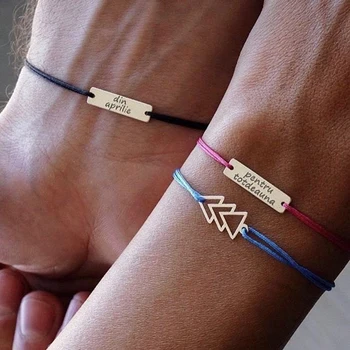Friendship bracelet
10 ways to make (and keep) friendships as an adult
Romance is often the most important thing in relationships. You can look at the self-help section of any bookstore and see thousands of ways to find a partner, keep one, lose one, or get over someone. There may also be tips on how you can hydrate your partner. But there is very little information about friendship.
As a clinical psychologist I’ve learned something surprising in my years of experience and research. Friends are often the source for our lives’ ups and downs, and sometimes they have a greater impact on our daily well-being than our families.
Our happiness can be determined largely by our friendship. They can help us create the rhythm of our lives and shape our dreams and goals, encouraging us to be who we are. True friendships can be more difficult to maintain and build in adulthood than they were in college, even though they are crucial.
Keep your chin up: You can make new friends if you are willing to put in the effort. This will allow you to grow in ways that you never imagined.

Table des matières
1. Make it a health issue.
For your physical, well-being, and mental health, strong friendships are vital. Poor social support can be as deadly as smoking 15 cigarettes per day. It is also known that having friends who are supportive in your 20s can help predict whether you will live to be 70. Nurturing friendships strengthen your immune system and lower the risk of developing chronic diseases. They can help lower the risk of emotional disorders such as depression, anxiety disorders, and post-traumatic stress disorder. If you are happy with your exercise routine, but don’t want to eat with the person who makes your heart smile the most then you need to shift your priorities .
2. Choose quality over quantity.
This is something we intuitively know. We can also recognize that our 500th friendship with a Facebook friend doesn’t offer much emotional richness. Research suggests that we feel more alone today than we did in the past, even though we have many “friends”. Many of us spend hours each week maintaining superficial friendships. We get lost in the sea of generic texts, bland emails and endless stream of social media. It’s easy to spend hours glued to Facebook or Instagram, posting LOLs and not doing anything to build real friendships .
3. Overcome transitions.
Not only is it harder to make new friends when you no longer have the automatic closeness you had with your peers at school, but it’s common (and natural) for friendships to weaken when life changes alter the relationship – from a geographical move to a job change to marriage, children, retirement, health issues or divorce. Many of us feel friendless after a life change – ashamed of the fact that we obviously don’t have many friends left – and yet this is a perfectly normal problem. It has nothing to do with your personality and everyone goes through it at some point. Those who deal with it better than they used to are the ones who take it as a logistical challenge to overcome, not something to be ashamed of.
It takes effort to make friends, and here’s a reality check: you need a few failed attempts. Would you expect to marry the first person you went out with? Not every friendship you try will work out, either. This is not to be taken personally; making friendships is a time-consuming process and in many ways a numbers game. And that’s the great thing about false starts: each one gives you a better understanding of how to refine your friend search and brings you a little closer to the right person.5. Get involved in the community.
Friendship does not have to be about one-on-1 relationships. It can also include the positive feelings that you experience when you are with someone. Being part of something greater than yourself You can. You can make new communities by creating them in any way you like.
Consider what interests you might be able to devote your time to. Participating in a community can bring you together with like-minded people, give you a sense of belonging, and even surpass the beauty of one-on-1 relationships.

6. Focus on follow-up.
Souvent, ce ne sont pas les rencontres qui sont difficiles ; peut-être même avez-vous plus de partenaires de conversation que vous ne savez quoi en faire. Mais beaucoup de gens se laissent piéger à ce premier niveau, superficiel, parce qu’ils n’ont pas le courage ou le savoir-faire pour aller un peu plus loin. Revenez sur un sujet abordé lors de la dernière conversation. Souvenez-vous de petites choses et posez des questions à leur sujet. Révélez quelque chose qui vous rend un peu vulnérable. Suggérez une sortie spontanée, achetez un billet supplémentaire pour quelque chose d’inhabituel. Faites un compliment. Suggérez à quelqu’un de vous envoyer un SMS pour vous dire comment s’est passé un événement important pour lui. Proposez-lui une ressource – même un simple lien dont vous avez entendu parler – que vous lui enverrez plus tard. La seule façon de passer d’une conversation sur la météo à une amitié de plusieurs décennies est de commencer par rendre les choses plus personnelles et continues.
7. Avoid technological traps.
Thanks to the many advances in technology, such as smartphones, social networks, and instant messaging, we can keep our friends close and expose ourselves to people we may not have known. The negative things can make it difficult to access the real source of emotional nourishment.
When we place too much emphasis on our screens, instead of our faces or voices, our interactions may become inhuman . Face-to face and voice-to–voice contact provide a level of spontaneity and warmth that our souls cannot live without. If you are lucky enough to be able to have coffee with a friend, place your phones at the center of the table. The first person to take their phone will pay the bill.
8. Gain momentum.
We’ve all been there: An attempt to meet up with former colleagues, new mothers, neighbours or old classmates stalls after the seventh “answer-all” response, when no time seems to work for everyone. Or you want to talk to a good friend on the phone, but you’re both always too busy to pick up. If you want to stay close, stop letting schedules contribute to worsening your relationship. Pick a set time – say, the second Sunday of every month for brunch or Wednesday afternoon for a phone conversation on your commute – and let it happen automatically. The magic happens soon after, when the event becomes routine, takes root and continues on its own, without any planning
9. End toxic friendships.
Is there a long-standing pattern of stress, imbalance or anger in a friendship? Do you constantly dread spending time with a friend, or do you leave them exhausted? Do you dislike what you are becoming with this person? It’s important to remove the emotional waste from toxic relationships to make room for healthier relationships. The inertia associated with unhealthy friendships can be powerful: guilt, fear and familiarity can keep us stuck in these relationships far longer than is good for us. But if you can get yourself to make real changes, you’ll have even more room for healthier relationships.
10. Don’t forget the little things.
Sometimes we get so focused on perfection that we end up sabotaging ourselves. For example, someone who wants to “owe” a friend a long, thoughtful email reply. They put it off and then don’t respond at all. What’s done is more important than what’s perfect. Did you forget to plan a surprise for your friend’s big day? You don’t have to stop your friend from getting his favorite candy or flowers. Have you missed your coworker’s wonderful baby shower? You can still bring a casserole to your coworker’s baby shower. A simple note on paper you can touch can make a lasting friendship.
It’s not the grand gestures that make a friendship last a lifetime, but the strong bonds it forms.











 (5 / 5)
(5 / 5)